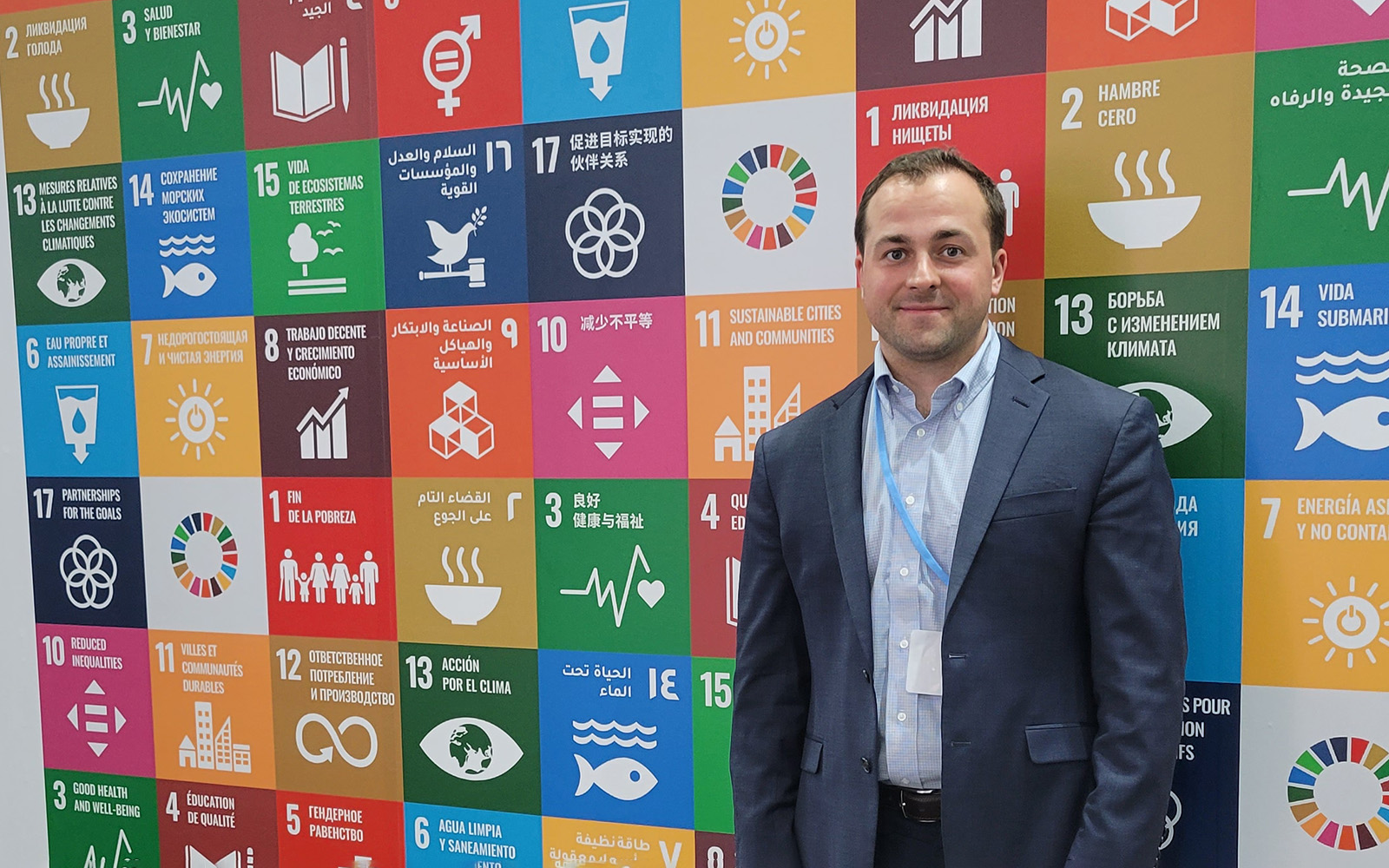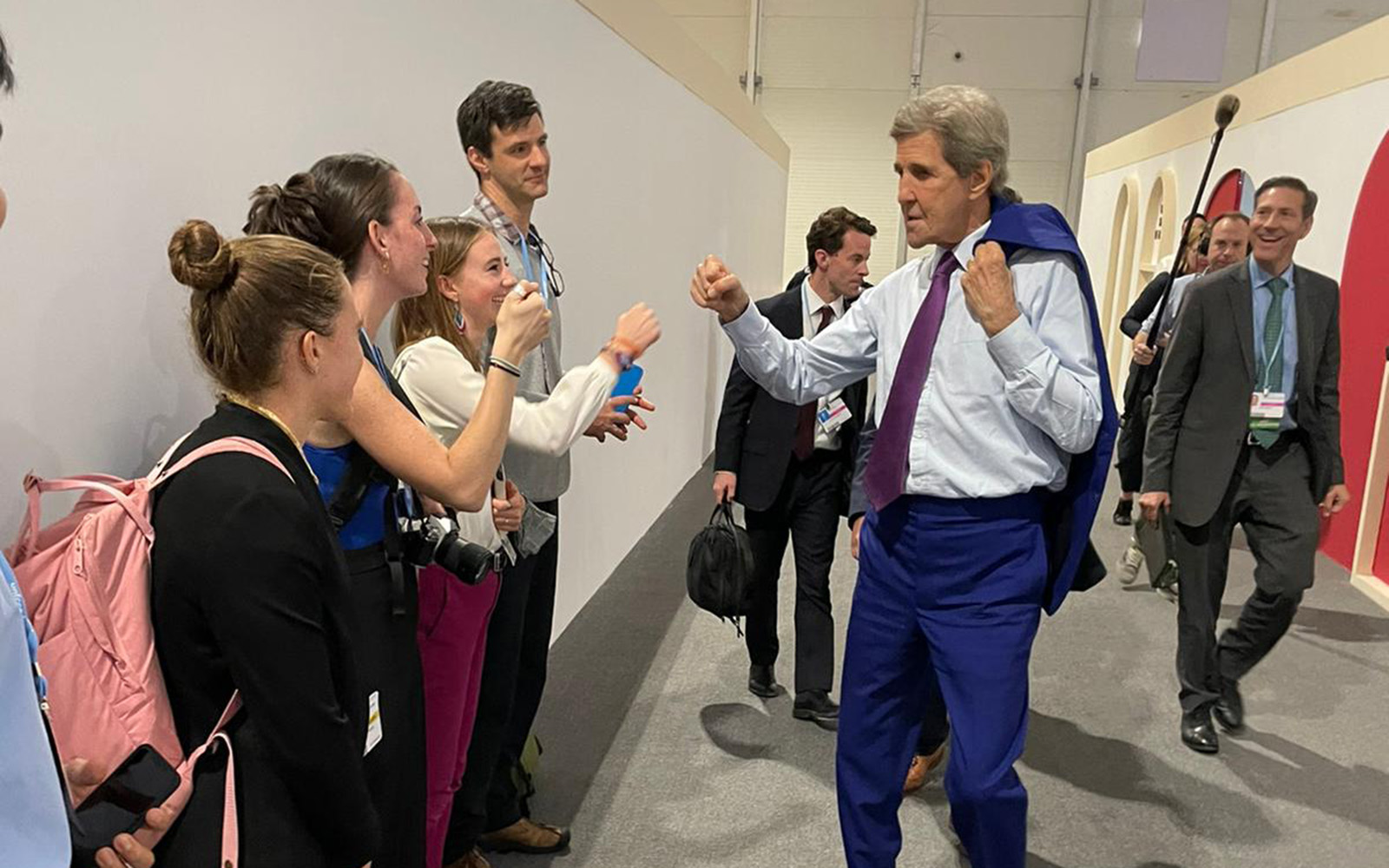
MBA candidate Ben North expected his experience at the 2022 United Nations Climate Change Conference (COP 27) in Egypt to be impactful, but it exceeded his expectations from the beginning.
Less than an hour after arriving, he and other UConn students were introduced to former U.S. Secretary of State John Kerry, now the U.S. Special Presidential Envoy for Climate.
The students thanked him for his leadership and he, in turn, welcomed the chance to read blogs they were writing about their experiences at the conference and their new perspectives.
“I was so over-the-top excited about the conference and after attending, it has become a punctuating point in my life,” North said. “People told me it would be a rollercoaster of emotions, and it was.”
“I felt a lot of optimism from all the leaders there, but also a bit discouraged as you hear heartbreaking stories about climate change from opposite corners of the globe,” North said. “You felt the weight of the world there!”

U.S. Can Lead with Policy, Innovation
As the only UConn business student among the 14 attending the conference, North was focused on the role that businesses and economic policies need to play to mitigate and adapt to the worst impacts of climate change.
North, a portfolio manager for the UConn Student Managed Fund’s MBA team, said he enjoyed discussions among conference attendees who focused on the world financial system’s seismic shift to direct the flow of investments toward decarbonized economies.
“I think that business is key in leading these changes, even playing a greater role than government,” he said.
There was also an emphasis on increasing transparency of emissions among businesses through new initiatives such as Climate TRACE, which uses satellite imagery and artificial intelligence to more accurately measure and identify emissions from the world’s largest polluters, North said. This development is particularly important in the context of the Net Zero Asset Managers Initiative in which asset managers representing more than half the world’s assets under management have begun making substantial commitments to achieving net-zero portfolios by 2050. Increased transparency will aid investors in the process of choosing companies which most closely align with achieving their net-zero goals.
“There are a number of similarly ambitious emissions targets set by governments and financial institutions, and businesses now need to adapt accordingly,” North said. “I think more businesses are seeing the writing on the wall and behaving pro-actively to achieve those goals.”
He sees the potential for the United States to lead those efforts.
“Hearing the numerous, ambitious commitments and calls for climate action from governments, businesses, investors, and community leaders around the world further reinforces the tremendous opportunity for the U.S. to demonstrate leadership in this transition by producing innovations the world will need to decarbonize their economies over the coming decades,” North said.
“This experience also made it exceedingly apparent that action against climate change can coincide with many co-benefits, such as the advancement of public health, national security, energy security, biodiversity conservation, and human equality,” he said.
Conference Drew Leaders from Almost 200 Nations
The COP 27 conference drew representatives from almost 200 nations, including 112 heads of state and 46,000 delegates. This year, the conference reached a breakthrough agreement creating a loss and damage fund for vulnerable countries impacted by the climate change when their citizens lives and livelihoods have been ruined.
That experience was driven home in a profound way when North spoke with a woman from Vanuatu, in the South Pacific, who told him about the impact of climate change in her nation, including creating salt-water intrusion impacting the country’s water supplies, reducing agricultural productivity, and degrading coral reefs and fisheries. The first-hand stories from COP 27 participants added more reality, gravity, and clarity to the climate crisis, North said.
Interest in Ecology Began as a Child
North will complete his fourth UConn degree when he earns his MBA in 2023. He earned two bachelor of science degrees, one in ecology and evolutionary biology and one in molecular and cell biology in 2014. He earned a master of science in biodiversity and conservation biology the following year. He subsequently earned a Ph.D. in natural resources economics from the University of Florida.
North said his interest in the natural world started as a child, visiting a nature center near his home in Connecticut while growing up. As an undergraduate, he wanted to further understand the complexities of earth’s ecosystems and biological diversity. That gradually morphed into an interest in innovative business and policy strategies to address pressing environmental issues like climate change.
North’s desire to combine his scientific background in environmental science and sustainability with enhanced business skills led him back to UConn for his MBA. He believes being able to communicate from both a scientific and business background is important for making change. His future plans entail either working for a company that supports sustainability, managing sustainable investments, or leading government policy efforts to advance sustainable economic development.
The UConn Office of Sustainability coordinated and helped fundraise for the students to attend the conference.
“I’m so pleased Ben was able to participate in this life-changing event. This trip to COP 27 is one of the great opportunities afforded our business students as we continue to strengthen collaborations across the UConn campus with entities like the Office of Sustainability, and the Human Rights Institute to name just a few,” said Arminda Kamphausen, Associate Director of Global Business Programs. “There is an underlying awareness that business needs to be included in these conversations, these movements, these opportunities for real progress on climate issues and for significant and lasting change to occur.”
A Transformative Experience
“This is an interesting period in human history, and evolving our economic systems around the reality of climate change and the degradation of our natural resources is a defining issue of our time,” North said. He believes Connecticut is a source of great inspiration in that arena, including the creation of the Connecticut Green Bank, the nation’s first bank created to accelerate clean energy adoption, and a place where he previously interned.
“I’ve been lucky to be a part of the UConn MBA program. It has been fantastic, and given me such an incredible path forward,” North said. “Being able to go to COP 27 has been a transformative part of my MBA experience.”
Professor Robert Bird, the Eversource Energy Chair in Business Ethics, provided financial support for North’s trip, and said it was a powerful opportunity for a business student to participate in a critical challenge facing the planet.
North agreed.
“The last day that I was there, I made a point to meet as many people as possible from around the world. If I were to go back, I would do that nonstop. It was great way to learn the desired outcomes for different countries in the negotiation process and to develop a clearer picture of everything happening,” he said. “I feel very fortunate, as I know many others would have greatly valued this opportunity. I plan to share this experience as much as I can with the broader UConn community and others in the state.”
Ben North will participate in the Global Business Leadership in Sustainability Summit at the School of Business on Friday, March 24, 2023. Additional information is forthcoming.